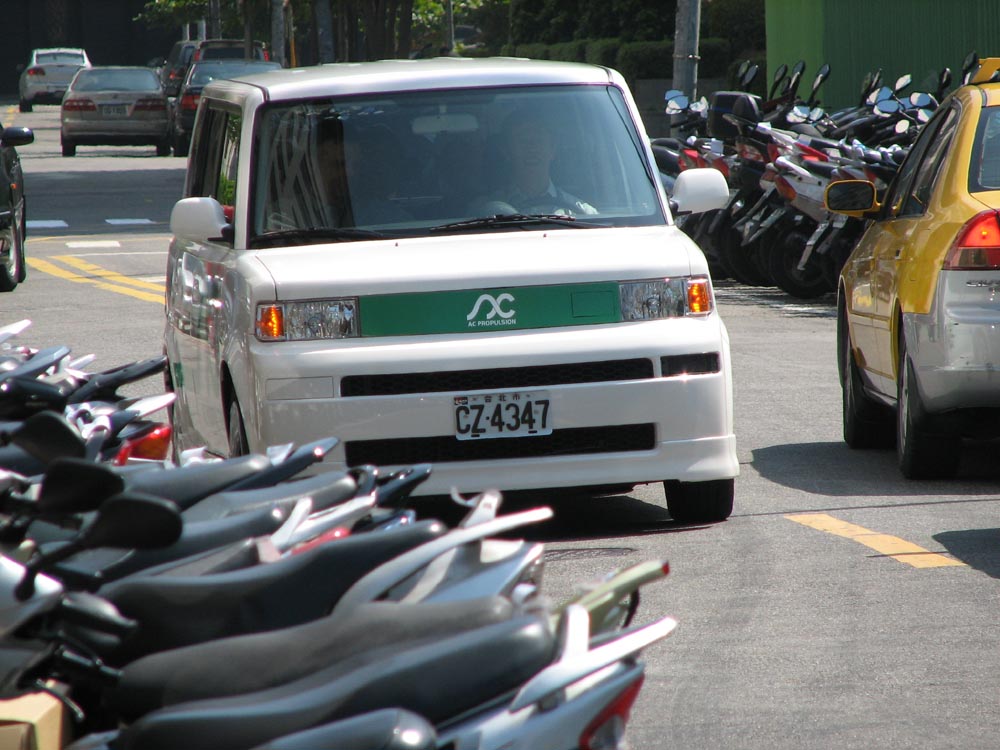Electrons driving us drivers and may juice up our future


Moderator, Jesse Deeter, Producer "Who Killed the Electric Car?". Tom Gage, CEO, AC Propulsion. They are makers of the eBox, an electric, five-seat "urban utility vehicle" Range : 150 miles. Also a sports car, tzero. eBox is currently $70,000. Gary Starr, Chairman, ZAP. Maker of the Xebra Zaptruck, Xero car and Zapino scooter. Car range: 350 miles. Ian Clifford, CEO, ZENN Motor Company. Hatchback urban commute car. 25 MPH top speed, 35 mile range. Sell for $15,000 or less. Dennis Hogan, CFO, Phoenix Motorcars. Light truck, freeway speeds. Range: 100+ miles. Price: $47,500 for fleet buyers. . TG: Our main business is development and manufacture of electric vehicle drive systems including a charger which can both take energy from the grid, or take energy from the car battery and put it back into the grid. The company also builds electric cars. GS: I built my first electric car here at UCDavis as a student here in 1974. Been working on cost-effective vehicles since 1994. We've now brought to market over 100,000 vehicles so far. IC: Started ZENN because I couldn't buy an electric car in Ontario. We decided to begin in the low-speed urban vehicle for the U.S. market. Launched production a year ago with 200 shipped so far. We are also partnered with eStore, electric storage tech company which is stil largely under wraps. DH: We are developing sports utility truck and car, a no-nonesense vehicle that can go on freeway and is half-ton truck. Can re-charge in ten minutes or late. Our target customer in the beginning are fleets which face federal mandates for zero-emission vehicles. -------- Moderator: who did kill the electric car [in the 1990s]? battery? DH:Not the battery IC: I agree that batteries did hurt the car [in the 1990s], recharging is a problem. Ten minutes is great, two minutes would be perfect. GS: The manufacturers spent more money killing the California electric car mandate than they did on selling those cars. TG: Batteries were not the issue. The early electric cars were efficient for the power available. -------- TG: The "neighborhood" vehicles get a lot of use because most trips are short ones. Full function cars will come down in price but they never need to be same as gas cars when you figure in environmental advantages. IC: There's an environmental imperative to move away from fossil fuel. It's a really stupid way to move cars around our cities and around our country. For mass appeal you still need a vehicle that will drive both around the corner, and across the country. Battery-electric is appropriate for local driving. DH: We already see prices coming down on electric car components. PG and E is talking about putting in rapid charge stations in northern California. ------ Moderator: where will the changes come in future transport, you guys or GM? TG: our founder consulted at GM when they built the EV-1 and he said he kept poking GM and never found a brain. GS: There's been continuous conflict between large corporations and electric vehicles. We're working with China where there are companies very interested in this technology. At the Olympics you will see the largest electric bus fleet in history, and electric garbage trucks. IC: Realistically we are all hoping to be part of that breakthrough. What we're demonstrating is the viability of this technology. DH: Most of the innovation is going to come from small companies. One of the competitors in the X-Prize is a pure diesel that'll get 160 miles per gallon. That kind of innovation won't come from major corporations. Chrysler may embrace some of the new technologies now that they are spun off. Nissan may be the first of the Big Six to come out with pure electric vehicle. ------- Where do battery-electrics fit in the field of alternative-powered vehicles. TG: China and India use aout six gallons of gas per person. In US, Japan and Europe we use about 200 per person, actually Japan and Europe use 100 and the U.S. uses 400 gallons per person. Even if every person in America drives a Prius tomorrow, we'd still be double any other nation. We have to look at what fuels make sense and don't have infrastructure barriers. Electricity is already has a huge infrastructure and so I see electricity as the best substitute for gasoline. GS: There is electricity everywhere [in U.S.]. Ten years ago electric bicycles did not exist. Now there are over ten million produced annually. And they have much less electricity infrastructure than the U.S. IC: We are looking at large-scale conversion kits for fleets and have a project right now in Mexico There is a huge investment in already-existing vehicles. DH: It will end up being a toss-up between hybrids and all-electric vehicles. There'll be conversion to biofuels which are renewable. Don't see much of a future for hydrogen, very inefficient to produce because it requires so much energy. I personally believe that's a deadend road. -------- GS: we do need the folks on this panel and some of our dealers to work together. The electric car dealer here in Davis has cars from three of us on this panel.